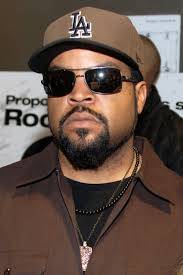Ice Cube, born O’Shea Jackson on June 15, 1969, in Los Angeles, California, is a rapper, actor, filmmaker, and entrepreneur who has made significant contributions to hip-hop and entertainment. Best known for his powerful lyrics and socially conscious themes, Ice Cube was one of the founding members of the influential rap group N.W.A and later achieved success as a solo artist and actor. His multifaceted career has solidified his status as one of the most important figures in hip-hop history and popular culture.
Early Life and Introduction to Music
Ice Cube was raised in South Central Los Angeles, a community characterized by its vibrant culture and pervasive social issues. His parents, Hosea Jackson and Doris Jackson, provided a stable home, but the surrounding environment was fraught with challenges, including gang violence and economic hardship. Cube attended William Howard Taft High School, where he began to develop an interest in music and poetry. He was influenced by the sounds of funk and soul, particularly the works of artists like George Clinton and Parliament.
Cube’s musical journey began in earnest when he joined the hip-hop group C.I.A. (Cru’ in America) in the late 1980s. His talent for lyricism and storytelling quickly caught the attention of industry insiders. In 1987, he collaborated with Dr. Dre and Eazy-E to form N.W.A., a group that would revolutionize the rap scene and bring the West Coast sound to the forefront of the genre.
Breakthrough with N.W.A
N.W.A’s debut album, Straight Outta Compton (1988), marked a watershed moment in hip-hop. The album featured raw, unfiltered lyrics that addressed issues like police brutality, systemic racism, and life in the inner city. Ice Cube’s contributions as a writer and performer were pivotal, and his verse on the title track became iconic for its fierce commentary on the struggles faced by African Americans.
The album’s explicit content and unapologetic messages sparked controversy and debate, drawing both praise and backlash. Despite (or perhaps because of) the criticism, Straight Outta Compton became a commercial success, selling millions of copies and solidifying N.W.A’s position as pioneers of gangsta rap.
However, internal tensions began to surface within the group, primarily over financial disputes and creative control. Ice Cube felt undervalued, especially regarding his royalties and contributions to the group’s success. After a bitter contract dispute with Ruthless Records, he left N.W.A in 1989, embarking on a solo career that would further establish his artistic identity.
Solo Career and Continued Success
Ice Cube released his first solo album, AmeriKKKa’s Most Wanted, in 1990. The album debuted at No. 19 on the Billboard 200 and showcased Cube’s growth as a lyricist and storyteller. Tracks like “Once Upon a Time in the Projects†and “Endangered Species (Tales from the Darkside)†exemplified his ability to blend social commentary with compelling narratives.
His sophomore album, Death Certificate (1991), was even more controversial and provocative. It explored themes of racial identity, systemic oppression, and the complexities of Black life in America. Songs like “No Vaseline,†a fierce diss track aimed at N.W.A and former bandmates, further cemented Ice Cube’s reputation as a fierce wordsmith. The album received critical acclaim and commercial success, solidifying his position as a prominent figure in hip-hop.
Transition to Acting and Filmmaking
In the mid-1990s, Ice Cube began to diversify his career by entering the film industry. His first significant acting role came in John Singleton’s Boyz n the Hood (1991), where he portrayed Doughboy, a character grappling with the challenges of street life. His performance received critical acclaim and opened doors for more acting opportunities.
Cube’s transition from music to film was marked by his work on Friday (1995), a stoner comedy he co-wrote and starred in alongside Chris Tucker. The film became a cult classic, showcasing Cube’s talent for blending humor with social commentary. The success of Friday led to two sequels and established Cube as a formidable presence in Hollywood.
Throughout the late 1990s and 2000s, Ice Cube continued to act in various films, including Barbershop (2002), Are We There Yet? (2005), and 21 Jump Street (2012). He also founded his production company, Cube Vision, which allowed him to take creative control over his projects.
Cultural Impact and Legacy
As an artist, Ice Cube has been influential not only for his musical contributions but also for his role in shaping the cultural landscape of hip-hop. He has used his platform to address pressing social issues, including systemic racism, police brutality, and economic inequality. His fearlessness in addressing these topics has resonated with audiences and paved the way for future generations of artists.
Ice Cube has received numerous accolades throughout his career, including several Grammy nominations and wins. He was also inducted into the Rock and Roll Hall of Fame as a member of N.W.A in 2016, further solidifying his legacy in the music industry.
Recent Projects and Continued Relevance
In recent years, Ice Cube has continued to be active in both music and film. He released the album Everythangs Corrupt in 2018, which tackled contemporary issues while maintaining his signature style. Additionally, he has remained involved in various film projects and initiatives aimed at addressing social justice.
Ice Cube’s impact extends beyond entertainment; he has been an advocate for political activism, particularly in promoting Black empowerment and community development. His involvement in the “Contract with Black America,†a plan aimed at addressing systemic inequalities, exemplifies his commitment to social change.
Conclusion
Ice Cube’s journey from the streets of Los Angeles to becoming a global icon is a testament to his talent, resilience, and dedication to using his voice for change. His work in music, film, and activism has left an indelible mark on popular culture, making him one of the most important figures in hip-hop history. With a career spanning over three decades, Ice Cube remains a powerful force, continually shaping the landscape of entertainment and advocating for social justice.




No comments yet
Be the first to share your thoughts!